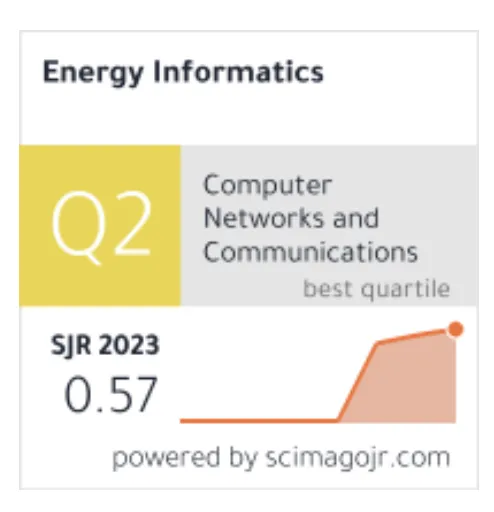Journal Q2: Energy Informatics
General NEWS

Energy Informatics
https://www.scimagojr.com/journalsearch.php?q=21101048366&tip=sid&clean=0
Indexing services
The full text of all articles is deposited in digital archives around the world to guarantee long-term digital preservation. You can also access all articles published by SpringerOpen on SpringerLink. We are working closely with Web of Science (Clarivate Analytics) to ensure that articles published in Energy Informatics will be available in their databases when appropriate. The journal is currently indexed in the following databases:
- SCOPUS
- Ei Compendex
- DOAJ
- Institute of Scientific and Technical Information of China
- Naver
- ProQuest
- OCLC WorldCat Discovery Service
- EBSCO
- Google Scholar
Article processing charges (APC)
Authors who publish open access in Energy Informatics are required to pay an article processing charge (APC). The APC price will be determined from the date on which the article is accepted for publication.
The current APC, subject to VAT or local taxes where applicable, is: £940.00/$1490.00/€1190.00
Visit our open access support portal and our Journal Pricing FAQs for further information.
Aims and scope
This journal aims to provide a unique platform for researchers and practitioners of energy informatics in various scientific, technological, engineering and social fields to disseminate original research on the application of digital technology and information management theory and practice to facilitate the global transition towards sustainable and resilient energy systems.
The journal publishes essential, peer-reviewed, interdisciplinary research addressing scientific, engineering and business topics related to energy, including but not limited to:
- Innovation in data-driven energy services and business models
- Big Data-driven smart Energy Management Systems
- Management of data and information flow in the Digital Energy System 4.0
- Data analytics for energy-cost efficient system operation
- Privacy issues in energy data management
- Digitalization of energy production, delivery and consumption, including policy and strategy
- Digital technologies for enabling energy-aware user behavior
- Contextual computing for supporting human and energy system interactions
- Energy-efficient Cloud Computing and data centers
- Cyber security issues for safe and reliable Smart grid operation
- Social media’s role in the transition towards sustainable energy
- Application of Artificial Intelligence and Agent-based technology in smart energy systems
- Model-based and data-driven energy forecasting, including energy production and use
- Management of public and private procurement of digital energy technology
- Socioeconomic opportunities and barriers for adoption of digital energy technologies
- Sociotechnical aspects related to design and implementation of smart energy systems
- Innovation management in smart energy business eco-systems
- Digital entrepreneurship in emerging energy markets
- Smart grid communication architectures and protocols for improving grid resiliency, including graceful degradation and self-healing
- Demand-side management, including demand response, dynamic pricing and incentive design
- Microgrid and distributed generation management and control
- Monitoring and control of Smart Buildings, including Smart Grid interoperability
Feb 13, 2025 at 11:18 PM